JAMMIN’ WITH THE SALMON
“Struttin’ with Some Barbecue” by Louis Armstrong is probably the best song title. It has action, smell and humor.
The worst title is “Rise Up to New Jewish Music.” A couple Jewish bands go for that sort of thing. They are not playing klezmer — which peaked a while ago. They are playing “New Jewish Music.”
Anything new is old.
Several newer klezmer bands don’t use klezmer in their names. Like Shtreiml, Golem and the Kosher Spears. (That last band is made up.)
“Yiddishe Cup,” the name, gets the job done around town, but doesn’t get us any gigs at Ashkenaz or other mohel’s-edge international music festivals. “Yiddishe Cup” is bubbe’s procus (grandma’s stuffed cabbage.).
Before Yiddishe Cup released its latest CD, Klezmer Guy, I test-drove several album titles. One was Jammin’ with the Salmon.

Smokin' salmon
Nobody understood it. “Nobody” was my wife, Alice. I didn’t run the title by anybody else. I didn’t want the aggravation of more artistic input. I’m not running a democracy. I settled on Klezmer Guy. It gets the job done.
— Bert Struttin’
February 11, 2011 1 Comment
AN ODOR OF GAS
To report an odor of gas, please call the East Ohio Gas Company (EOG).
Question: Has anybody ever donated to EOG? On the monthly EOG bill, there is a space for voluntary contributions. Who gives to EOG? EOG has an ego problem.
I give to EOG. And it hurts. I don’t give charity; I give dollars for heat. Not-news department . . . Cleveland has long cold winters.
Emily, a former tenant, asked if I would pay her $66.24 EOG bill, because she had moved and the gas company was still billing her for stove gas.
I wasn’t going to pay Emily’s bill. I pay the apartment gas bill but typically not the tenants’ individual stove bills. I volunteered to call EOG for Emily.
EOG wouldn’t talk to me because I wasn’t Emily. Fine. I don’t enjoy talking to EOG. This dispute was between EOG and Emily, EOG said.
 Or maybe the dispute was between Emily and my new tenant, Elizabeth, who was possibly using Emily’s stove gas.
Or maybe the dispute was between Emily and my new tenant, Elizabeth, who was possibly using Emily’s stove gas.
I told Emily I would call Elizabeth.
Elizabeth — the new tenant — said to me, “I’m in this apartment only three days a week. I use the toaster-oven and microwave. I don’t even use the stove! It’s off.”
Impossible, Emily told me. And she added, “Somebody incurred a sixty-six dollar bill. It wasn’t me!”
But you can incur a $66.24 gas bill just by glancing at your stove, Emily. There is something called a “basic monthly charge.” Right now that charge is $19.63.
Emily wrote me several letters, the last one ending: “See you soon in court.”
I smelled an odor of gas.
I received a 25-page small-claims lawsuit. Emily wanted her gas money back, plus double her security deposit, for a total of $1,150.71.
The magistrate, plus Emily, Emily’s dad and I, met in a hearing room at city hall. The dad was OK; he parked next to me and didn’t “key” my car.
I had a letter from EOG, explaining who had service when and in who’s name. I won because of that letter. An EOG secretary had done me a favor. Her letter was not from the pre-approved letters’ templates, she explained.
Thank you, EOG. I pledge $___.
How much should I give? Double chai?

—
[Goys only: Chai (life) equals 18. Double chai is 36.]
—
Please see the post below too. It’s fresh.
February 9, 2011 1 Comment
A MIKE NAMED MOISH
Klezmer violinists often don’t get along with klezmer clarinetists. The animosity goes back to the late Chagall era.
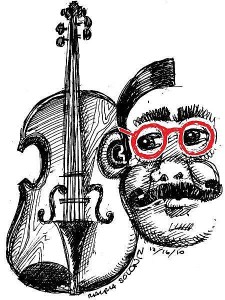 In the early 1900s, recording engineers favored the piercing clarinet over the murky violin. Studios had big acoustic horns the musicians played into. The clarinet’s sound picked up better than the violin’s. The clarinet’s ascendancy was quick, and the violin became passé and alter heym (old country).
In the early 1900s, recording engineers favored the piercing clarinet over the murky violin. Studios had big acoustic horns the musicians played into. The clarinet’s sound picked up better than the violin’s. The clarinet’s ascendancy was quick, and the violin became passé and alter heym (old country).
Violinists are sensitive about this.
Violinists don’t like playing second fiddle. They ask for “more violin” in the monitor mix and the house mix. (The “monitor mix” is what the band hears on stage. The “house mix” is what the audience hears.)
Truce time . . .
Let’s just forget about mikes. You don’t see them at New Orleans parades. You don’t see them at bluegrass jam sessions. Ban mikes. Let lungs rule.
Yiddishe Cup’s keyboard player, Alan Douglass, likes to get to concerts early to talk about mikes with the sound mixologists. Alan is Yiddishe Cup’s spokesman to the sound guys; if I would let the other band members chime in, we would spend the entire sound check saying, “more clarinet,” “more violin” and “more vocal.” Every musician has a focus — himself.
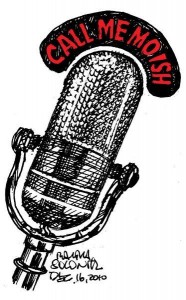 I tell the sound techs, “Can you turn my moish up?” (I like moish better than mike. As for mic, that is totally absurd. Fiction alert.)
I tell the sound techs, “Can you turn my moish up?” (I like moish better than mike. As for mic, that is totally absurd. Fiction alert.)
Before Yiddishe Cup goes on stage, the sound guys — for no apparent reason — spin all the dreidels on the mixing board, and we sound like soup.
Throw away the mikes, musicians. If you can’t hear yourself, so what? You shouldn’t have taken up violin.
February 4, 2011 4 Comments
VOCAL REST
I wrote “Berkowitz-Kumin,” a song about the local funeral home:
I went down to Berkowitz-Kumin
To see my baby there
They said I could not view her
No open casket
It’s a Jewish affair.
[Please click on the video to continue.]
—
Please see the post below too. It’s probably new to you.
—
Yiddishe Cup plays at The Ark, Ann Arbor, Mich. 8 pm Sat., Feb. 4.
CLOSED CAPTION. Here is what the man in the video is saying, more or less, prior to playing “Berkowitz-Kumin”:
I took up singing. That injured me. Anybody can sing, but I got a sore throat. I wanted to perform the song “Berkowitz-Kumin,” about the local Jewish funeral home. It was a parody on “St. James Infirmary.”
The song bombed when I sang it at a nursing home. Worse, I strained my vocal cords.
I could hardly talk for three weeks. My wife, Alice, thought I was stonewalling her. About the only thing I said was “I don’t want to hose down the garage.”
She insisted I make a doctor’s appointment, which I did and cancelled. I bought mounds of cough drops.
Alice said the cough drops would clog my throat. They helped. Tea worked too. The Internet advised me not to talk at all for two full days.
The first day I sat through two family breakfasts. The first breakfast was at an Ann Arbor restaurant with my younger son, an undergrad, and the second was at a pancake house in Toledo with my older son, a law student. My sons didn’t talk. They never do. My wife carried the ball. (First down, Alice. The Ann Arbor restaurant, Benny’s, was near the stadium.)
I went to a party. I brought a bag of cough drops and a bottle of water. I said, “What are you up to?” That’s all I had to say.
And if anybody asked, How’s the band?, I said, “Still Playing. What else are you up to?”
That was my vocal rest.
February 2, 2011 1 Comment
BASEMENT GUY
A Yiddishe Cup fan said she lived in the house I had grown up in. I asked her if the basement was still wood veneer paneling.
Yes, she said.
My teenage sister had lobbied for that basement veneer. It made for better make-out parties. Basements were where the action was. It was where you got all kinds of work done.
How do people in sunny climates get any work done?
My friend and neighbor John Cermak lived in his basement his entire adult life. He installed a pool table, gun rack and shower.
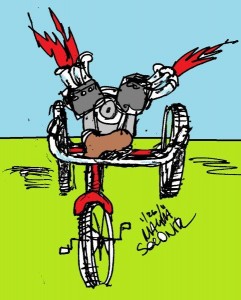 When I became a landlord, I often called John for advice on boilers, blown fuses and backhoes. When he was about 8 years old, he mounted a lawnmower engine on a tricycle. He was my guru of the physical world. John was also good at academics; he was interested in everything from English literature to Saab car engines. He graduated St. Ignatius High and John Carroll University.
When I became a landlord, I often called John for advice on boilers, blown fuses and backhoes. When he was about 8 years old, he mounted a lawnmower engine on a tricycle. He was my guru of the physical world. John was also good at academics; he was interested in everything from English literature to Saab car engines. He graduated St. Ignatius High and John Carroll University.
John died at 41 from complications of mental illness and alcoholism. He could put away a case of Wiedemann’s in a single weekend. Or was it in a single day?
I still often think of calling John. For instance, the electric company called and said, “The voltage at the cap is good.” It was? If the voltage was good, why didn’t we have any power in four suites? The electric guy said, “The inside line, outside, is yours.”
John, you there?
January 28, 2011 No Comments
THE TENNIS COURT SHOVELER
Rich Greenberg, a former tennis pro, thanked me for the blues harmonica lessons I gave him 32 years ago. My lessons — in conjunction with pros’ instructional videos on YouTube — had helped him, Rich wrote in an email.
Rich ended with “Do you still play tennis?”
What? Tennis? Tennis was another lifetime ago, Rich. And what exactly is “tennis”? Hacker tennis, club level, or college caliber?
When Rich and I were in high school, tennis was a tree of life to lay hold fast of. Rich shoveled the snow off the courts at Cain Park in Cleveland Heights. Nuts. He played so well he wound up on the UC-Santa Barbara team. Maybe the Cali coaches needed a court shoveler. (Rich has been out west for decades.)
 Rich taught me an important life lesson: how to wait. I waited six months every winter to play tennis. I wasn’t going to shovel courts. Think about it: no snow blowers in the 1960s, and the courts had to be perfectly dry. And right after you shoveled, it would snow again.
Rich taught me an important life lesson: how to wait. I waited six months every winter to play tennis. I wasn’t going to shovel courts. Think about it: no snow blowers in the 1960s, and the courts had to be perfectly dry. And right after you shoveled, it would snow again.
Contemplating tennis — and not playing — was like practicing music without an instrument. It was doable, but not much fun. I had Bill Tilden’s book on singles and Gardnar Mulloy’s doubles book. There was no tennis on TV.
I wasn’t in Rich’s league. (Correction: I was in Rich’s league. Rich went to Cleveland Heights High and I went to Brush High. Heights and Brush were in the Lake Erie League. No question, though, Rich was much better than me.)
Tim Gallwey in The Inner Game of Tennis recommends watching the spin on the ball. Focus on the rotation of the ball’s seams. The author of The Inner Game of Music said something similar. Focus. I can’t remember on what. (Not as good a book as Inner Tennis.)
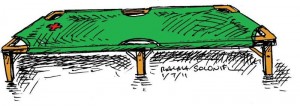 I sometimes focus on a green cot, as a mental image, when I play a concert. The cot is an emergency-shelter Red Cross cot. Keeps me calm.
I sometimes focus on a green cot, as a mental image, when I play a concert. The cot is an emergency-shelter Red Cross cot. Keeps me calm.
When I was a sub on a gig, the bandleader shouted at me: “Listen!” Meaning “Listen to the music!” Maybe I was distracted by the hors d’oeuvre.
In my twenties, after college, I thought tennis was just stupid. Dumb. Existentially dumb. Two adults hitting a ball over a net. That was not solving any world problem.
I hung out with Rich at his tennis pro job in Rocky River, Ohio. Rich said he couldn’t teach the middle-aged women — the 35 year olds — anything new. He said, “I wish tennis hadn’t boomed. It would force me to do something else.” He spent time arranging interclubs between “our girls” and Lorain.
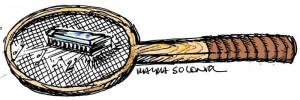 Rich, in his email, asked if I still played harmonica. I said I sometimes play harp in first position on the song “Tsena, Tsena.”
Rich, in his email, asked if I still played harmonica. I said I sometimes play harp in first position on the song “Tsena, Tsena.”
“First position” means playing diatonically (no sharps, no flats). It is usually simple non-bluesy melodies. First position, initially, is insipid and idiotic, just like tennis.
Then you grow up.
—
Please see the next post too. It’s an original video from Klezmer Guy Studios.
January 26, 2011 2 Comments
STORE STORY
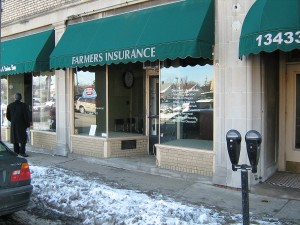
This insurance agency used to be a witch’s store. Before that, it was a deli.
Here’s the store’s story, as told by Mr. Landlord. [Please click on the video to continue.]
January 21, 2011 1 Comment
FISHING FUN
My mother went deep-sea fishing off the coast of Miami Beach and caught a sailfish in 1965. She had the fish mounted, and over the years, the trophy fish moved around like Waldo. It’s in a garage now at my nephew’s in Arizona.

Cleveland Press
When I was young, my family went to Florida just that once. I’m not saying we were deprived. I’m saying I didn’t go to Florida regularly like my wife did!
My wife, Alice, went every single year. Her family stayed at the Deauville. Even Alice’s mother (a small-town Jew from West Virginia) went to Florida annually in her childhood. That was in the 1930s, to a kosher hotel in Miami Beach.
I married into money. Or so I thought. [See the post “Major Roofer.”]
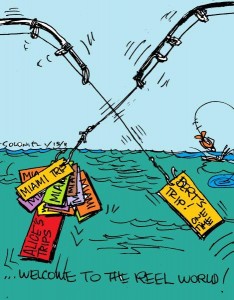
In the mid-1980s, I took my parents’ car and drove from Boca Raton (where my parents had a condo) to Miami Beach, looking for extremely old Jews. The Boca Raton Jews weren’t old enough for me; I wanted to see Isaac Bashevis Singer and similar alter kockers in Collins Avenue cafeterias.
Philip Roth’s father had stayed at the Hotel Singapore. So had Meyer Lansky. Mickey Katz patronized the Delano. (I didn’t see these men. That would have involved time-traveling.)
The Clevelander Hotel at 10th and Ocean Avenue featured a horrible restaurant, Harpoon Mickey’s. I saw plenty old Jews on that trip.
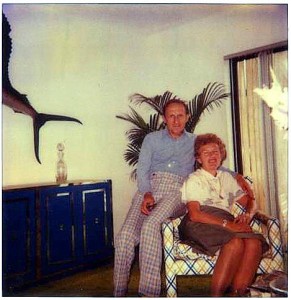
A piece fish, plus Toby and Julia Stratton. Florida, 1983
Last winter I returned to Miami Beach and saw very few old Jews. I saw a lot of jet-setters speaking foreign languages and wearing nearly nothing.
I noticed the Clevelander Hotel was spiffed up; the bedroom floors had a silicon seal to keep the guests’ puke from seeping to the rooms below. The Clevelander was now rocking. I looked for T-shirts in the hotel gift shop and read about the silicon seal in a local newspaper article.
At the Fontainebleau Hotel, Max Weinberg’s swing band was playing in the lobby. The horn players — studio musicians from California — were wailing. What a treat, and it was free.
I phoned the cultural arts director at the Boca Raton JCC. She was on vacation. I wondered, Where does a Miamian go for winter vacation? I left a voice mail: “Yiddishe Cup wants to play in Boca again!”
Success. We landed the Boca fish. Yiddishe Cup plays the Boca Raton JCC this Sun. (Jan 23), 3 p.m.
—-
Please see the post below too. It’s fresh fish.
January 19, 2011 4 Comments
HALF A NAGILA
January is the big month for wedding planning. Yiddishe Cup usually advertises in the Cleveland Jewish News “Weddings” supplement, which comes out next week.
Women ponder dresses, make-up and plastic surgery. There are also ads for face lifts. The face lift ads are for mothers of the brides, presumably.
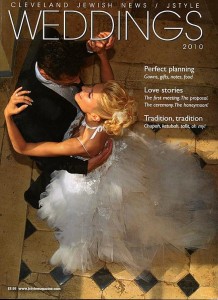 There isn’t much talk about music in the wedding mag supplement. It’s more about dresses, flowers, rings and gifts for the bridal party. Destination weddings are another major topic.
There isn’t much talk about music in the wedding mag supplement. It’s more about dresses, flowers, rings and gifts for the bridal party. Destination weddings are another major topic.
The wedding bands in the CJN supplement are usually of a certain type: sexy female lead singer, black male singer, plus a lot of horns and guitars.
Then there’s Yiddishe Cup (we place a small ad): no females, no blacks and a lot of Jews.
A lot of Jews can’t stand a lot of Jews. The majority of Jews want just a few minutes of “Hava Nagila” at a wedding. They want half a Nagila.
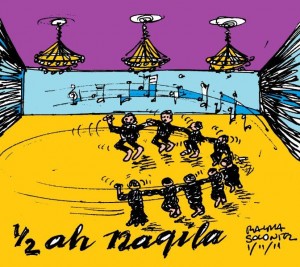
A prospect asked for a five-minute hora. I told her a Yiddishe Cup hora has to be at least 10 minutes.
She said, “In that case, I’ll give my DJ a CD for a five-minute hora.”
January 14, 2011 3 Comments
MAJOR ROOFER
I like roofs more than most people. I even married a roofer’s daughter.
My late father-in-law, Cecil Shustick, had a roofing company in Columbus, Ohio. He was an orthodontist prior to being a roofer. Look it up.
Cecil was an orthodontist in the early 1950s. Meanwhile, Cecil’s father owned a roofing company. Cecil had a wartime neck injury, so he didn’t relish standing all day at a dental chair. Furthermore, orthodontia wasn’t yet a big moneymaker in central Ohio.
 Cecil did mostly roof estimating. He eventually ran a 27-man, 9-truck company.
Cecil did mostly roof estimating. He eventually ran a 27-man, 9-truck company.
He talked to me about roofs and gutters. Gutters are interesting: copper, galvanized (the worst) and coated.
Cecil didn’t offer me the biz. He should have, my father said. My dad said Cecil should have at least given me the opportunity to say no.
Dad, I wasn’t moving to Cow-lumbus to run a roofing company!
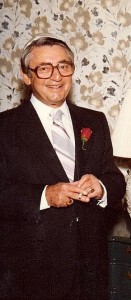
Cecil Shustick (w/ ciggy), 69. (1978)
When Cecil retired, he sold the business to Don The Goy, his right-hand man, who ran the biz into the ground. Cecil lost a lot of money on that, and so did I, indirectly.
If I had taken over the business, I probably would now be in a nice house in Bexley, Ohio, with a stack of workers’ comp claims in front of me. (A lot of roofers are overweight drinkers with back problems.)
That wouldn’t be much different than the way I did wind up!
 Cecil was a bon vivant. He kept a quart of piña colada by his bed for dry throat, due to antihistamine overuse, he said. He liked top-shelf, like Chrysler Imperials and Chivas Regal. And he didn’t like sweating. Golf was his game. Cecil said, “If man was meant for jogging, he’d have hooves.”
Cecil was a bon vivant. He kept a quart of piña colada by his bed for dry throat, due to antihistamine overuse, he said. He liked top-shelf, like Chrysler Imperials and Chivas Regal. And he didn’t like sweating. Golf was his game. Cecil said, “If man was meant for jogging, he’d have hooves.”
***
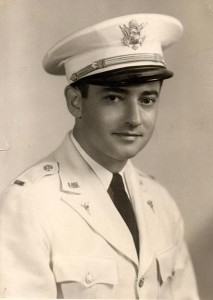
Cecil Shustick, U.S. Army Dental Corps, circa 1942
Cecil worked in roofing, went to war and raised a family. I didn’t know that “early Cecil.” I knew the retired Cecil, my father-in-law in the velour warm-up suit with the Marlboros.
Don Whitehead, an A.P. correspondent, filed a dispatch, Dec. 3, 1943, with the Fifth Army south of Rome:
In one large, roomy cave Capt. Cecil Shustick, Columbus, Ohio, and Lt. Samuel Clarkson, Lebanon, Ky., set up a medical detachment station. On the little ledge, a charcoal fire was burning to take the damp chill from the air . . .
The Italians had used the caves as storage places for vegetables, fruit and grain. When the Americans came along, they moved into them and used them as command posts, medical stations and billets.
This is a valley of hell – a man-made hell of thunder and lightning . . . The guns never cease their striking. Whole batteries of them roar in unison with a concussion that shakes the earth.
Cecil Shustick came home a major with a Bronze Star for heroism at the Battle of Monte Cassino, Italy.
Give him the piña colada medal too, posthumously. Cecil kept things light and bright. You’d never know about Italy.
—-
Please see the post below too. It’s fresh and it’s football.
—-
Yiddishe Cup plays the Boca Raton (Fla.) JCC Sun. Jan. 23. 3 p.m.
January 12, 2011 11 Comments
FOOTBALL . . . WHY?
In the Midwest, you need to know something about football. You don’t need to know much.
Here’s what you need to know today:
1. Rich Rodriguez — the just-fired Michigan football coach — is going to the University of Pittsburgh, where the brand-new Pitt coach allegedly beat up a woman and just got fired. (This is speculation, the Rich-to-Pitt bit.)
2. The Big Ten has 12 teams. The league should add the University of Toledo and put a lid on new powerhouses.
3. I told my sons I was going to watch the Mississippi State – Michigan game on New Year’s. They laughed at me. Who cared about that game, they said. (I didn’t dare watch.)
4. My Ohio State-alum dad, of blessed memory, is breathing easy for another year; Ohio State beat Arkansas in the Sugar Bowl.
5. The Sugar Bowl is the Allstate Sugar Bowl. Next year take a charter flight to the Manischewitz Borscht Bowl. Everybody wears pink and knocks back “l’chaim” vodka shots. It’s in Pinsk.
6. My former neighbor, a rabid Michigan fan, lit a votive candle after every Wolverines touchdown. The candle triggered a music box that played the Michigan fight song. Those were the days. Michigan won a lot. (About four years ago.)
7. What’s Michigan going to do for a coach? You tell me.
 8. If you want to see real, quality, cheatin’ football, go down south.
8. If you want to see real, quality, cheatin’ football, go down south.
9. Maybe you don’t want to see football. Then please see the Weekend Klezmer Report,
item #10:
10. Klezmer star Michael Winograd is bar-storming the West Coast, playing nearly every bar and bar mitzvah between Los Angeles and Oregon. Tomorrow The Wino is at Havurah Shir Hadash in Ashland, Oregon. Kikhl-off is 8 p.m.
[Kikhl is “sugar cookie.”]
—-
Thanks to journalist Stan Urankar for the Rich Rod–to-Pitt tip.
January 7, 2011 2 Comments
YID LIDS
Maybe a collage artist can do something with my yarmulke collection, from 22 years’ worth of gigs. I know an artist — a bad one — who did something with old saxophone reeds.
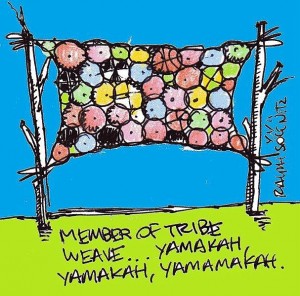 My Guatemalan yarmulkes, crocheted by Mayan Indians, are from neo-hippie weddings. There are no bouquet tosses, garter-belt strip routines, or formal introductions at these weddings. The Mayan kippot (yarmulkes) are particularly popular with female rabbi brides. That’s a niche — weddings of women rabbis — that Yiddishe Cup has cornered in the Midwest.
My Guatemalan yarmulkes, crocheted by Mayan Indians, are from neo-hippie weddings. There are no bouquet tosses, garter-belt strip routines, or formal introductions at these weddings. The Mayan kippot (yarmulkes) are particularly popular with female rabbi brides. That’s a niche — weddings of women rabbis — that Yiddishe Cup has cornered in the Midwest.
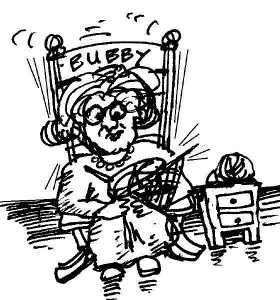 The most heymish lids are grandmas’ knitted yarmulkes.
The most heymish lids are grandmas’ knitted yarmulkes.
My blue suede yarmulkes are from A-1 Skull Caps. The lids don’t breathe. Skull cap. I like a yarmulke that breathes.
Camouflage kippahs exist, too. One Yiddishe Cup musician, a pacifist, declined to wear his camo lid at a Zahal-themed bar mitzvah. Zahal is the Israel Defense Forces (IDF). The bar mitzvah boy’s father wore combat boots and a full Israeli uniform. The band wore IDF T-shirts and camouflage yarmulkes. (Nobody noticed our musician in street clothes.)
 I have six purple kippot from a bar mitzvah. I thought the band might want to wear the lids again at another bar mitzvah. Go for the clean David Clark Five look. The guys declined.
I have six purple kippot from a bar mitzvah. I thought the band might want to wear the lids again at another bar mitzvah. Go for the clean David Clark Five look. The guys declined.
We wore sports yarmulkes — plus basketball jerseys — at a sports-themed bar mitzvah party. The party even had a cheerleading squad:
Mazel tov / Let’s shout hurray / It’s Jeremy and Sam’s bar mitzvah day!
I say oy / You say vey / Jeremy and Sam are men today!
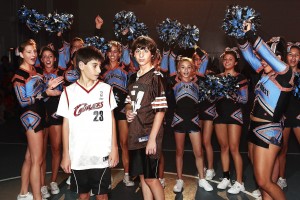
Yiddishe Cup’s keyboard player, Alan Douglass, frequently asks, “Is this a yarmulke gig?” He’s a goy and can’t figure out what’s up with the various Jewish denominations.
My Conservative rabbi wears a throwaway satin lid that funeral homes and synagogues give out. He apparently doesn’t want to look different from his congregants. I haven’t asked yet — after 20 years — why he wears the throwaway.
My white satin yarmulke from Dec. 9, 2007 has “Ananth Uggirala” — the groom’s name — in it. The groom’s parents were Anjaneyulu and Manorama Uggirala. I had to announce them. Tip, please.
You need good hair clips for a yarmulke. Bobby pins are the worst; they take your hair out with the yarmulke. Duck bill clips – also no good. The best clips are the surfboard barrettes. If you don’t have these clips, get some, particularly for outdoor gigs.
If you drop a yarmulke, you don’t have to kiss it before putting it back on. A lid is a lid. It’s not a holy object. Also, goys, wear the lid at the wedding ceremony; you’re not exempt.
At an American-Israeli wedding, one of the chuppah (bridal canopy) bearers smoked and balanced a drink. His yarmulke fell off. Secular Israelis, they’re funny that way.
It’s shocking when you see an Orthodox guy without a lid. For instance, an Orthodox man might go into a non-kosher restaurant on a road trip and take his yarmulke off. (Some Orthodox, when in the sticks, will go to a fast-food place for a salad.)
I wore a yarmulke for a week when I hitchhiked the coast of California in my twenties. I had seen a photo of Bob Dylan wearing a yarmulke at the Western Wall. Dylan did yahm-ops at The Wall every couple decades, it seemed.
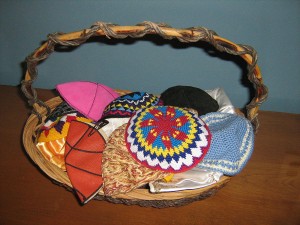
My Easter basket of yahms makes for a moderately interesting pop-psych experiment on shabbes: Who is going to take the pink, who is going to take the matzo-textured lid, and who is going to hide behind the black lid?
Have fun with lids. That’s in the Torah somewhere.
January 5, 2011 9 Comments
THE WIN-O-GRAD — A QUALITY CLARINET
[If you came here because of the Cleveland Jewish News, to read about the Fed man’s mega-salary, please click here for the relevant post. If you’re here for other reasons — like you madly love this blog — simply go to the next line.]
Michael Winograd, 28, is one of the best klezmer clarinetists. He plays a handcrafted, custom-ordered clarinet from Canada. The axe looks like a howitzer, sounds tres robust and weighs a ton. It should be in Cooperstown next to Babe’s bat. Winograd‘s clarinet has extra keys to hit extra notes. For instance, the octave key controls two tone holes — not just one — to get perfect intonation.
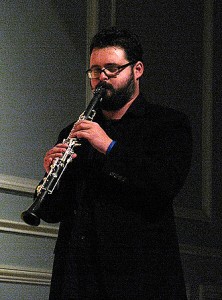
Miguel Winograd
I saw Winograd’s instrument in Cleveland across a living room. I could almost feel its emanations. Yes! A clarinetist and I were about 15 feet from Winograd, and my friend asked what kind of horn Winograd had. I erroneously guessed it was an Albert system horn, like New Orleans jazz musicians used.
There are only about 15 Win-O-Grads in the world, according to Winograd. (Stephen Fox Clarinets, Canada, makes the Win-O-Grad. Fox typically calls the product an “extended-range C clarinet.”)
How does one compete against the Win-O-Grad?
Good question.
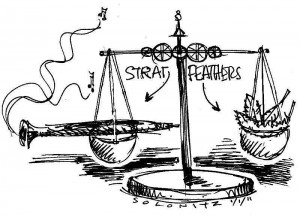 Here’s how: The Strat. The Strat clarinet. (Similar to a Strad violin, but several thousand dollars cheaper.) The keys are molybdenum. The pads are horsehair. The bore – the inside of the horn – is swimming pool liner. The axe is titanium and weighs nothing.
Here’s how: The Strat. The Strat clarinet. (Similar to a Strad violin, but several thousand dollars cheaper.) The keys are molybdenum. The pads are horsehair. The bore – the inside of the horn – is swimming pool liner. The axe is titanium and weighs nothing.
The Strat is excellent for jazz, klezmer or classical. The end of the clarinet (the bell) has a touch pad; press “1” and a music stand appears; press “2,” you get a pre-licked reed; press “3,” your choice of Heineken’s or Coors.
The Win-O-Grad is a shtik pipe cleaner compared to The Strat.
—-
[Shtik means “piece.”]
December 31, 2010 4 Comments
WHAT ARE YOU EATING FOR NEW YEAR’S?
Not all musicians have gigs on New Year’s Eve.
A lot of would-be partiers stay home for a quiet evening, or they go to the movies. There aren’t that many gigs. The era of the fraternal organization New Year’s Eve dinner dance is long gone.
Sometimes people eat special New Year’s Eve foods. I know a family that eats lobster. My family eats oatmeal on New Year’s Eve. We learned that habit in Akron, Ohio.
 Yiddishe Cup had a gig at First Night Akron for 12 years in a row, and occasionally my family stayed overnight at the Quaker Square hotel, which was in a remodeled Quaker Oats grain silo. The hotel’s New Year’s Eve dish was oatmeal, served at midnight.
Yiddishe Cup had a gig at First Night Akron for 12 years in a row, and occasionally my family stayed overnight at the Quaker Square hotel, which was in a remodeled Quaker Oats grain silo. The hotel’s New Year’s Eve dish was oatmeal, served at midnight.
Yiddishe Cup didn’t play First Night Akron last year. The event coordinator called and said, “We’re reducing our footprint.”
My wife, Alice, plus a Yiddishe Cup musician and his wife, made a small dinner and then we went to the movies. Not memorable, except for the oatmeal.
Klezmer musicians around the country lamented the downsizing of First Nights. This kvetching started a couple years ago on a Jewish-music listserv. First Nights had been the rage in the 1990s but had become part of the scenery. (Similar to klezmer music’s popularity arc.) In the 1990s, the director of First Night Akron told me she had just been to a national First Night conference in Boston and the word was “get a klezmer band.”
Yiddishe Cup worked up to playing First Night Akron. We played Warren, Ohio, First Night a couple times prior. (A good event.)
Last year I checked out First Night Akron’s program online. I looked to see if another klezmer band was playing. There was a Beatles tribute band, a blues band and a couple generic American acts. That was gratifying.
Yiddishe Cup is back at First Night Akron this year. “Raisins and Oatmeal.” That will be our opening song. No, it won’t. The tune doesn’t exist. We’ll open with
“Shalom Aleichem” — the version made popular by Shmuel Brazil and Regesh.
—-
Yiddishe Cup plays First Night Akron this Friday., 7:30 p.m.
—-
Sports fans, please see the post below too.
December 29, 2010 4 Comments
WAVING O’ THE GREEN
The highest paid Jewish communal worker in America is Steve Hoffman, president of the Jewish Community Federation of Cleveland — a united charities for Jews. Hoffman makes $687,000 a year.
He makes more than double the Atlanta federation president’s salary; 86 percent more than the Detroit chief; 56 percent more than the Chicago president; and more than the boys in New York. [Source: Forward]
This gives Cleveland Jews another excuse not to give tzedakah (charity). Donors want reasons not to give.
“That’s disgusting. He should be in private industry,” said a friend of mine.
Another friend stopped giving to the federation because a volunteer called and asked my buddy to up his pledge. My friend didn’t like the personal touch; he stopped giving altogether.
I asked the federation to switch my pledge solicitor. I was in the federation’s real estate division — where the heavy-hitters are — and I didn’t want a phone call from an owner of a “lifestyle” shopping center, on principle. Now I have a friend who solicits me. And with email, it’s all pretty painless.
I give.
 But when I read in the Forward last week that Steve Hoffman is making two cents for every dollar the Cleveland campaign raises, I had second thoughts on Hoffman’s two cents. A sizable chunk of the federation’s annual $28.8 million campaign is going to Hoffman.
But when I read in the Forward last week that Steve Hoffman is making two cents for every dollar the Cleveland campaign raises, I had second thoughts on Hoffman’s two cents. A sizable chunk of the federation’s annual $28.8 million campaign is going to Hoffman.
On the other hand, Hoffman is no doubt a capable executive, dealing with very finicky donors around the clock. He also oversees the federation’s enormous endowment and philanthropic funds. He was offered $687,000 a year and took it. That’s not a crime. He’s probably a good guy. Just an overpaid good guy.
In my father’s day, the federation published an annual blue book that listed everybody’s contributions. My dad was proud he was “anonymous.” My former rabbi, Michael Hecht, differed. Rabbi Hecht said it was best to attach your name to your contribution so peers would be embarrassed and/or motivated to give more. (The bell rings . . . Rabbi Hecht vs. Maimonides.)
The best place to give — at least in the non-Jewish realm — is to the Salvation Army. The Salvation Army is a religion. The Sallies — the troops — are almost like nuns. The Sallies don’t spend much on overhead. They are in the streets, doling out food. And don’t forget about their brass bands.
Every year I write on my Salvation Army donation: “I’m Jewish.” I got a call from the major once. He didn’t mention the Jewish part.
The most ardent fund-raising drive ever, surprisingly, was at Klezkamp — the artsy klezmer convention. A spirited 80-something New Yorker took center stage and asked for pledges. He announced the pledges and checks . . . $18, $25, $36, $50. A musician gave $5,000. That was Gates-ian. When all the pledges were counted, the speaker said: “Here’s something I learned from our Irish friends. It’s called the waving o’ the green.” He took a dollar from his wallet and waved it. Klezkamp volunteers with buckets circulated through the crowd to collect bills the audience waved back.
It was good theater, somewhat creepy, and somewhat effective. A buck goes into the bucket. “Transparency” in action. Nobody at Klezkamp was making $687,000 from that bucket.
—-
Please see the post below too. It’s fresh paint.
—-
And win a free CD — One Ring Zero’s Planets — by entering Zeek‘s First Klezmer Liner Note Contest. Zeek is a Jewish Journal of Thought and Culture. I wrote the rules for the Zeek contest. Click here to enter, or just to read the nutty rules.
—-
Yiddishe Cup plays First Night Akron (Ohio) 7:30 Fri. , Dec. 31.
December 22, 2010 3 Comments
A WHITER SHADE OF WHITE
A modern apartment is easy to paint. You just roll the drywall.
Prewar apartments, however, can take two days or more. You need to cut-in at the baseboards and at the mullions, and sometimes it’s smart to use two shades of white to contrast the woodwork and the walls.
 sSteve — a West Side apartment painter — has more words for white than Jews have for fool. Steve talks about antique white, Navajo white, pearl white, bone white and pure white (a.k.a. hospital white). [Fool in Yiddish: nar, shlemiel, shmendrik, shmegege, yold.]
sSteve — a West Side apartment painter — has more words for white than Jews have for fool. Steve talks about antique white, Navajo white, pearl white, bone white and pure white (a.k.a. hospital white). [Fool in Yiddish: nar, shlemiel, shmendrik, shmegege, yold.]
The big question at Lakewood Paint and Wallpaper was “Oil or latex?” Another pertinent question was: “Is Dutch Standard the same as Dutch Boy?” No, Dutch Standard is from Canton, Ohio. Dutch Boy is the nationally known subsidiary from Sherwin-Williams, Cleveland.
 Bill, a paint salesman, made regular calls at Lakewood Paint. He said, “I would stick with an alkyd [oil]. You kids will try anything.” He looked at me. “Let me ask you something. Are you a Yehudi? That’s a word only one of us would know. What’re you doing here?” (On the West Side.)
Bill, a paint salesman, made regular calls at Lakewood Paint. He said, “I would stick with an alkyd [oil]. You kids will try anything.” He looked at me. “Let me ask you something. Are you a Yehudi? That’s a word only one of us would know. What’re you doing here?” (On the West Side.)
“I work for my old man.” (I was 26.)
“Four years of fun and game at college,” Bill said. “Now look!” He studied my painter’s clothes. “There are only two Yehudis at Dutch Standard. Me and another guy.”
. . . Yehudi Ha-Rishon (The First Jew). That was a Hebrew school primer about Abraham.
Yehudi Ha-Shayni (The Second Jew). That was Bill, who wandered the Northeast Ohio paint-store circuit in the 1970s.
December 17, 2010 1 Comment
CLEVELAND IS NOT A CUPCAKE
A man with a strong Israeli accent called. I thought he wanted to rent a store. A lot of prospective store renters have foreign accents, particularly Middle Eastern.
But the Israeli wanted to talk music. He wanted to sell me a Yiddishe Cup ringtone.
Then I got a call from Elias, who wanted to open a bakery.
“You would be my second Elias!” I said.
This Elias – like the first Elias — was Lebanese.
I’ve also rented to Eli, a driving school operator.
Christian Arabs are often Eli, Elias, or Mike. Or Sammy.
 I rented to Shaukat Ali. Not a Jew. (Not a Christian either.) Ali was a Pakistani computer repairman. He began wearing all white, growing a beard and praying in his store. He lost some business.
I rented to Shaukat Ali. Not a Jew. (Not a Christian either.) Ali was a Pakistani computer repairman. He began wearing all white, growing a beard and praying in his store. He lost some business.
Widad called. I asked Widad if that was her first name. Yes. She wanted to open an Arab restaurant. She said, “Have you ever been to the Middle East?”
“Israel,” I said.
No biggie. Most Arab store owners are just trying to make a living.
I once attempted to talk Middle East politics with an Arab tenant. He said, “That’s over there. I’m here.”
Wadid wanted to sign the lease right then. I said, “Whoa, Widad” (to myself). I said, “You’ll need about $100,000 for grease traps, exhaust hoods, upgraded electrical service, architectural drawings, two ADA-approved bathrooms and a fire extinguisher system.”
The restaurant didn’t happen.
***
There were two Ivans, both Croatian shoe repairmen. One was small and friendly, and the other was terrible. He banged so relentlessly on his anvil he nearly drove the photographer next-door nuts. I had the walls soundproofed.
But we purposefully did a shoemaker (a lousy job) on soundproofing the shoe repair store. To soundproof a room correctly, you have to float a new wall and stuff the crawl space with fiberglass, and it still won’t work.
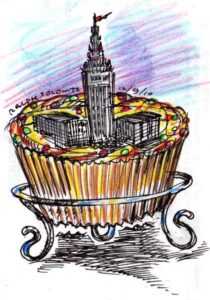 A friend considered opening a cupcake shop.
A friend considered opening a cupcake shop.
Cleveland is not cupcakeville, I thought. I said, “You can go broke with a trendy concept in Cleveland.”
You don’t need cupcakes.
But if you do, there is an excellent Hungarian bakery. You drive by this place for years and don’t even notice it. Tommy’s Pastries, Madison Avenue, West Side. There is nothing in the display windows. Tommy’s makes a zserbó, a chocolate/walnut/apricot dessert.
Zserbó is the Cleveland cupcake.
—–
Bandleader Walt Mahovlich told me about Tommy’s and zserbó. (Pronounced ZHAIR-boh.)
—–
Here’s an amusing new video — and free singing lesson — from Yiddishe Cup’s alternate drummer:
—-
Please see the post below too. It’s fresh goods.
December 15, 2010 4 Comments
WALKMAN MAN
Walt Mahovlich, the leader of the Gypsy-style band Harmonia, had hundreds of cassette tapes in his living room. He had custom-made bookshelves lined with tapes. There were Yugoslavian field recording from the 1970s and commercial ethnic tapes from the 1980s and 1990s. And he had dubbed some LPs to tape.
Walt’s wall o’ tapes was organized by nationality: Albanian, Croatian, Hungarian, Jewish, Macedonian, Romanian, Rusyn, Serbian, Slovak and Turkish.
A tape — a brand-new chrome tape with Dolby — often sounded as good as the original LP. But few dubbers bought chrome. Even the commercial tapes released in the 1980s weren’t always chrome.
One big downside to tape: the tape player would occasionally eat the skinny tape, and you’d have to splice it back to health.
The cassettes, with their cases, were compact. Give them that.
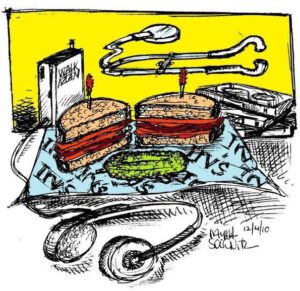 I bought a Sony Walkman cassette player in 1981, just prior to my first son’s birth. My wife, Alice, went through three 24-hour shifts of obstetricians before she delivered. I had the cassette tapes (dubbed jazz LPs) and two corned beef sandwiches from Irv’s Deli. I was set. My wife had complications.
I bought a Sony Walkman cassette player in 1981, just prior to my first son’s birth. My wife, Alice, went through three 24-hour shifts of obstetricians before she delivered. I had the cassette tapes (dubbed jazz LPs) and two corned beef sandwiches from Irv’s Deli. I was set. My wife had complications.
The doctors wanted to check it out. Not the complications. The Walkman. They had never seen one.
Three years ago I bought a Chinese Walkman knock-off for $40 at Radio Shack. I thought the Walkman might disappear.
Sony recently announced the end of Walkman cassette player production.
Two words: Stock up.
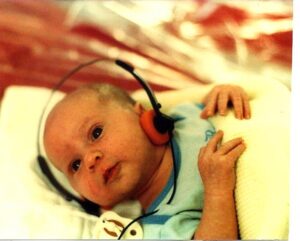
Teddy Stratton, 1 month
***
Walt Mahovlich’s wall o’ tapes still exists in the same West Side living room.
Last week Walt said, “I should transfer my tapes to digital. Who knows how long they’ll last — the tapes. But what I really need to do is record a 78 — something that will really last!”
“You want to record a 78 RPM?”
“Yes. Alan [Yiddishe Cup’s keyboard player] has a 78-making machine. I saw it years ago. I want to record a tune, then prematurely age the disc — the 78 — and place it in strategic places for people to find.”
“Like at Goodwill stores?”
“Maybe. It’ll be a hoax, like Piltdown Man.”
“An original tune?”
“No, a clarinet piece I learned years ago. I’ll call it ‘Der Freylekher Bulgar’ for the Jewish market and ‘Lerinsko Narodno Oro” for the Macedonians. It’ll be the same tune, two markets. Like Tarras.” *
“Do you have a Walkman?”
“No, I’ve never had one.”
“You should get one.”
“I have a tape deck. I’m set.”
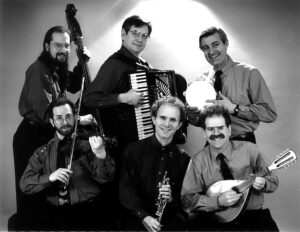
Walt, on accordion, had an aura. 1983
—–
* Dave Tarras, klezmer clarinetist, sometimes “re-gifted” his Jewish tunes to fit the Greek market, and vice versa.
“Der Freylekher Bulgar” is Yiddish for “The Happy Dance.” “Lerinsko Narodno Oro” is Macedonian for “Lerin Region Folk Dance.”
Thanks to Lori Cahan-Simon, musician and Yiddishist, for the correct spelling on “Der Freylekher Bulgar.”
December 10, 2010 3 Comments
MIRROR IMAGES
Yiddishe Cup occasionally plays mirrored halls.
Take La Vera. Or Casa di Borally. Or La Malfa (no mirrors but still heavy Italian).
Our latest mirrored hall gig was Armenian. Yiddishe Cup knows two Armenian tunes, which gets us through the night. We mix them with klezmer, jazz and pop.
I’m not bad on “Cold Duck Time” by Eddie Harris. Not good either.
I thought there were 300 people at the La Vera gig, because of the mirrors. There were about 150 people.
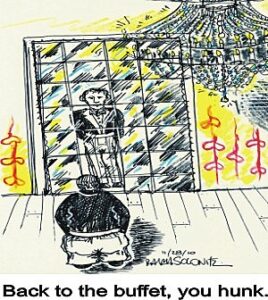
A guest asked if Yiddishe Cup is available July 11, 2011, for his daughter’s wedding at La Malfa. Yes, La Coppa Yiddishe is available, and call soon. July 11 is “tomorrow” in the band biz.
***
The premier mirrored hall in Ohio is the Hall of Mirrors at the Hilton Netherland Plaza in Cincinnati. That mirrored hall, built in 1931, is modeled after the Palace of Versailles.
Yiddishe Cup played a wedding in the Cincy hall for the great-grandchild of Arnold Schoenberg. A guest even sang a medley of Schoenberg art songs midway through the reception. That was a bigger party-killer than benching (post-meal prayers).
Yiddishe Cup is playing a Cincy wedding tomorrow night at the National Underground Railroad Freedom Center. We’ve never played there. Mirror situation, per favore?
—-
Illustration by Ralph Solonitz.
December 3, 2010 4 Comments
THE TOP 10 JEWISH ALBUMS
OF 2019
My apologies for not reviewing klezmer albums more frequently. My computer keyboard needs de-icing. There’s bad weather here. But no more excuses. Here are the best Jewish recordings of 2019.
1. Jews with Bagels. The Klezmatics cruise down the MOR (middle of the road) here, looking for the big paycheck– the one with six bagels after the “1.” Sure hit: “Tiny Bagels in the Wine.”
2. We Can’t Hear You. Klezmer Conservatory Band. This beloved group still pops, babbles and spits like a newborn. Recorded in a nursing home, in bed, in PJs. Hef feel. Swings.
3. Music for Young Lovers from Northern OH, Western PA and Western NY. Funded by NELFTY (Northeast Lakes Federation of Temple Youth). The record is lively waltzes and ballads for teens to cruise to. Not sure if this recording will keep the kinder from moving to Chicago and the East Coast, but it’s worth a try.
4. Ladder Me Up. Andy Statman’s homage to The Chief. If you buy this one, you can skip shul for six weeks.
5. The Great Hang. Steven Greenman’s triple CD. All originals, recorded in a single weekend (i.e. the great hang). Violinist Greenman sings on several tracks. Heavy breathing. Sexy. Not bad violin, either.
6. Lee Tully vs. Billy Hodes. Reboot. These two obscure 1950s Jewish comedians come out swinging. Tully’s version of “Essen” versus Hodes’ take. Two Jewish fighters in the same ring. You don’t see that every day unless you’re at an Orthodox shmorg (pre-wedding buffet). Hodes wins.
7. Jerzy Kosinski’s Ketchup. Daniel Kahn. What’s the difference between blood and ketchup? Are Heinz and Hunt’s the same thing? How’s the pourability? Where did green ketchup go? This recording is viscous . Check it out.
8. It’s All Greek. A bootleg from England. This double CD has 56 never-released Mickey Katz songs recorded for the Greek market. Includes “Open Half a Day on Sunday” and “My Gyro is Dripping.”
9. Readings on the Klezmer Generation. Bert Stratton’s cabaret show, recorded live at Nighttown in Cleveland. Stratton has a strange voice, as if he swallowed a bag of plastic Passover plagues. Painful on first listening, but after four cups of wine atrociously on-target.
10. The Jewish People are Mio. Roberto Rodriquez is 100 percent Jewish here: all freylekhs all the time. This is the perfect gift for the person who has everything but a Latin-Jewish alarm clock.
December 1, 2010 6 Comments
